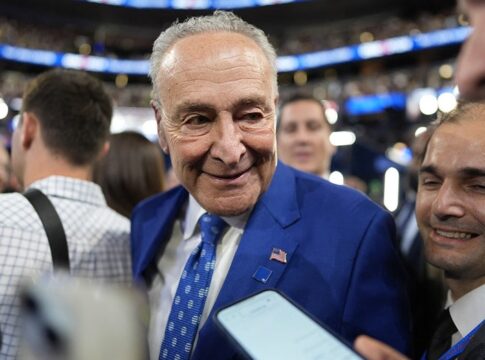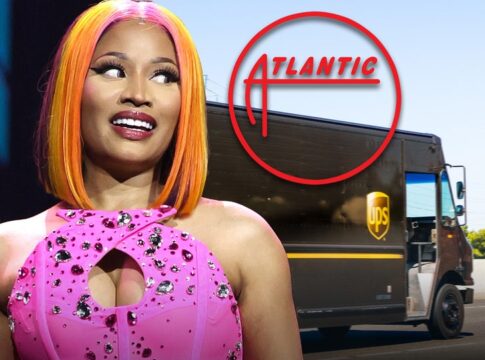In The Penguin, Colin Farrell steps back into the fat suit and prosthetics of Oz Cobb, former driver, current club-owner, and aspiring mob boss. The show, which draws clear inspiration from Jeph Loeb and Tim Sale’s classic Batman arc The Long Halloween, takes place immediately after the events of The Batman, and follows Cobb’s attempts to take over the Falcone crime family. His rivals for the throne are numerous, but none are as tricky as Sofia Falcone (Cristin Milioti, always great), better known as the Hangman, a serial killer who just returned from a stint in Arkham Asylum. The show is equally entertaining and rife with clichés, with much of the appeal stemming from its star’s gonzo, go-for-broke performance. Farrell being so compelling should not surprise us—in good movies and bad, he is often the best thing on screen—but that he is this good giving a performance this bizarre is truly a welcome surprise, the wildest transformation yet from an actor prone to self-reinventions.
The Penguin thinks himself the smartest man in any room, a Machiavellian genius who has hidden his true nature behind his physical deformities and a slimeball obsequiousness. His clear antecedent is Shakespeare’s Richard III, who shares with Oz his physical handicaps, ambition, and flair for constant scheming. One could even imagine Oz telling someone, as Richard tells the audience, that since he does not look like a leading man, he is “determinéd to prove a villain.” But unlike Richard, whose plans mostly go off without a hitch until the very end of his eponymous tragedy, Cobb’s plans always blow up in his face, forcing him to improvise to save his skin. This is when the show is at its best, when we get to watch someone who is both smarter than everyone thinks and not as smart as he believes himself to be fumble toward his future. While The Penguin is most often compared to The Sopranos, its soul belongs to the second season of Breaking Bad. Not only does the show feature a new drug with a distinctive color, but the Penguin even gets paired with a younger apprentice (Rhenzy Feliz’s Victor Aguilar), with whom he has an ambiguously paternal relationship that may or may not be entirely manipulative.
It’s these ambiguities—about Cobb’s intentions, his affections, his wisdom—and the way Farrell keeps us guessing about the character that brought me back to the show, even as I found myself bored by its familiar, Christopher Nolan–style take on a Batman story. The Penguin was originally conceived by Bob Kane and Bill Finger as a parody of a Gilded Age robber baron, complete with monocle, top hat, and cigarette holder. His name was not the blunt Oz Cobb, but the hilarious Oswald Chesterfield Cobblepot, and he was the “Gentleman of Crime” whose literal misdeeds underwrite the social crime of pretension. There were deep social anxieties dramatized within this. The Penguin was created in 1941, three years before the GI Bill helped pave the way for various immigrant outsiders (many Italian and Jewish, some of whom were involved in organized crime) to gain legitimacy in American society. Despite his faux-Oxbridge name, Cobblepot is this desire, and the impossibility of this desire, made manifest. But, like the Jewish parvenu Simon Rosedale in Edith Wharton’s The House of Mirth, he cannot quite cross the gap and become legitimate, and is instead both ridiculous and more than a little threatening at the same time, a serio-comic grotesque.
All of this is stripped away from our latter-day Penguin. Instead he is an outsider of a different sort—disabled, ugly, from a working-class home—the kind of guy whose own mother insults him for not earning enough money, the kind of guy who will never accumulate enough to fill the void where acceptance should be. This is a type we’ve seen many times before, but Farrell reinvents him, just as the hair and makeup crew on the show reinvent Farrell. With a voice like gargled glass, a limp, a fat suit, and extensive prosthetics, he looks and sounds like James Gandolfini ate James Cagney and then spent his recovery in the hospital watching the complete works of Robert De Niro. Farrell adopts Italianate hand gestures, a thick New Joizey accent, and a whole array of large facial expressions. The transformation is so thorough that your mind cannot quite accept that this is actually Colin Farrell you’re watching, in much the same way that H.P. Lovecraft’s detectives cannot quite describe the horrors they discover. When a younger Cobb appears in one of the unnecessary flashbacks that are now de rigueur in prestige television, you would be forgiven for thinking at first that they had digitally face-smoothed the actor playing Cobb instead of creating a second set of masks and prosthetics for the man underneath it all.
There is, however, one tragic side effect to all of this: We do not get to see Colin Farrell’s real eyebrows, which feels a bit like watching a season of basketball and not getting to see Steph Curry shoot a single 3-pointer. Why, oh why, in the name of all that is holy, would you cover up Colin Farrell’s eyebrows? If actors are often taught to refer to their bodies and voices as their “instrument,” Farrell’s eyebrows are the Stradivarius in the orchestra of his art, able to take the lead at any moment, to lift from the center up, forming two inverted commas in order to express need and pain, or to cluster at the lower center of his brow in confusion at the world he confronts. They can communicate hope or pain, anger or empathy, kindness or cruelty. They can tinge his performances with irony, or make him into the most sincere man alive. They can also—and this is vital to his work—make his characters seem far, far, less intelligent than Farrell clearly is.
Farrell’s intelligence and subtlety are the hallmarks of his art, but this wasn’t always the case. By 2004, when he made Alexander, a terrible attempt at a sword-and-sandals epic directed by Oliver Stone, he was something of a laughingstock. Manohla Dargis dismissed his work in that film in one brutal sentence fragment—“Colin Farrell, upstaged by an epically bad dye job”—while Anthony Lane, noting that Alexander was supposed to be Farrell’s big test as a blockbuster leading man, wrote in the New Yorker that he comes across as if he “had researched the life of Anne Heche by mistake.” Two years later, after making The New World with Terrence Malick and Miami Vice with Michael Mann (both great movies—and box-office failures), he entered rehab, and a period of doubt about his chosen profession. At this point, Farrell was his generation’s Icarus, a soaring wunderkind who, after a critically acclaimed performance in the little-seen Tigerland and a supporting turn in Minority Report, got anointed Man of the Year by GQ before he’d ever anchored a hit, and then fell to Earth with booze and drugs, never to be seen again. Or, as he told the New York Times more prosaically, “I was due a kick in the arse. … Because I was annoying. I had so much, so quick. I was so cocksure.”
Soon after he emerged, newly sober, Martin McDonagh offered Farrell In Bruges. Ever since, the actor has revealed again and again just how good he can be. When we want to praise the acting of good-looking men, we tend to say that they’re “a character actor stuck in a leading man’s body,” and with Farrell, there’s some truth to that. With the exception of Miami Vice, where he brings a hangdog soulfulness to Sonny Crockett, a man used to being in control of himself and his surroundings who finds himself destabilized by love at first sight with a woman he’s supposed to be investigating, there’s little sign in Farrell’s big-budget early films of how exquisite and delicate a performer he would turn out to be. Starting with In Bruges, however, in which he was allowed not only to be funny but to use his native Irish accent, Farrell proved both his versatility and his talent.
This is particularly visible in three recent movies that put a tonal straightjacket over their casts: The Lobster, The Killing of a Sacred Deer, and After Yang. The first two, directed by Yorgos Lanthimos at his most deadpan, require his casts to dial everything down to the absolute minimum. The Lobster, which feels like a movie made by an alien to explain human relationships to his fellow aliens, takes place in a bizarre dystopia where people who are unable to find love by a certain deadline get transformed into animals. Farrell’s character has a huge arc in the film, from complacency to terrorism to self-mutilation, but the film’s humor comes from how he seems to barely register what is going on or its import, in much the same way we take for granted the absurdities of our own reality. In Sacred Deer, Farrell plays an arrogant surgeon who faces a curse for accidentally killing a patient while drunk, but much of the film’s dialogue revolves around banalities about watchbands and how people should eat spaghetti. It is only through the subtlest flicks of those magic eyebrows that we see the mounting distress in his character, a feeling that will eventually find expression in murderous rage.
After Yang, a beautiful (if uneven) examination of memory from the pseudonymous writer-director Kogonada, concerns a devoted father named Jake (Farrell) and his daughter’s malfunctioning android, Yang (played by Justin H. Min). As Jake attempts to figure out what went wrong with Yang, he ends up involved in deeper mysteries about both Yang’s past and what it means to be a human being. After Yang is filled with fascinating ideas and moments as precise as the inner workings of a music box, but it is also tasteful to a fault. Every shot is perfectly composed, every character is kind, and every actor is forced to recite their lines in soft near-whispers. There’s a purpose to this—as in Blade Runner, the differences in affect between the fake humans and the real humans are nonexistent—but it pushes the film into so low a key it feels like it is apologizing for its own existence. Still, Farrell manages to imbue Jake with profound depths of feeling and tenderness toward his family. As he struggles to figure out his ethical obligations to the gradually expanding web of people around Yang, we feel Jake’s pain, and his desire to be a better father, even if both of these never find explicit expression within the film. It’s a marvel of what Stanislavski-based acting teachers call playing against: Rather than play the emotion, play the character trying not to express the emotion, and the tension created by this will make the work more interesting and true. Farrell is so good at playing against that he makes it seem easy, as if he’s doing barely anything at all. But to see how tricky this balancing act is, one has only to compare his performance with his castmates’, many of whom seem totally at sea trying to work within the rigorous boundaries of Kogonada’s style.
While Farrell’s comeback to being a blockbuster leading man seemed to blow up on the launchpad with the uninspired 2012 remake of Total Recall—and thank goodness for that—he is now acclaimed and widely beloved. He is so effortlessly charming in Apple TV+’s recent Sugar and that one could imagine him being the guy you called 75 years ago when Cary Grant wasn’t available, but he’s also done darker work as damaged, corrupt men in Widows and True Detective Season 2. Last year, he garnered a Best Actor Oscar nomination for Banshees of Inisherin, the latest bit of nihilistic blarney from McDonagh, losing to Brendan Fraser’s more traditionally Oscar-baiting turn in The Whale.
It might be tempting to trace a line from that loss to Farrell’s own donning of a fat suit for The Batman, but Farrell’s choices of roles over the years have never smacked of statue-chasing, and his performance in the film is about as far from Oscar-bait as one could get. Instead, Oz Cobb feels like a new frontier for him, a way to explore a different side of his art to see what the possibilities are. It’s not his only recent experiment, nor is it the only time he’s deliberately gone away from his pretty-boy looks. For the little-seen AMC+ show The North Water in 2021, he packed on both fat and muscle to adopt a physique modeled on 19th-century boxers to play a brutal arctic explorer. In both of his films with Yorgos Lanthimos, ridiculous facial-hair choices (a mustache in The Lobster, a preposterous beard in Sacred Deer) turn his very familiar face into something new and strange.
But, unlike the Penguin, these performances are not radical departures from psychological realism or our normal standards of good taste. There’s nothing realistic about his performance of the Penguin. If anything, Farrell is like a classically trained clown doing mask work in the world’s most dour commedia dell’arte show. Deprived of his real eyebrows, and most of the small muscles in his face, he adopts a physical and gestural style that are unique in his filmography.
Even as he eschews the subtlety that he’s so finely honed over the past 15 years, he still finds many layers within Oz Cobb. In particular, Farrell squeezes every last ounce of humor out of a character who is stuck in very self-serious material. Witness, for example, Cobb, in The Batman, lecturing Batman and Gordon on Spanish grammar (“the worst Spanish I ever hoyd!”), or, in The Penguin’s first episode, the way he complains about the number of pickles on his sandwich. Farrell clearly understands that you can make Gotham City as gritty as you want to, but Batman will always be a story about a billionaire who dresses up in bulletproof pajamas so he can beat up the mentally ill. The little filigrees of humor, along with the wounded humanity he finds lurking within Cobb, are what make both the role and the eponymous show work. As with James Gandolfini’s Tony Soprano and Bryan Cranston’s Walter White, it’s these glimpses of humanity that make characters who should be unbearable compulsively watchable. Farrell does it, as he does all of his other work, through unexpected grace notes, ones that sound out even amid all the comic-book bombast.




